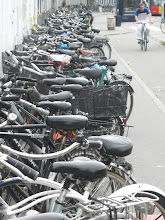
Okay, my title may be a little imperfect as much of the world still loves the bicycle and many western countries like the Netherlands and Denmark have been big bicycle advocates for years.
But on a global scale, bikes have taken a big hit over the past decade as millions of people in developing nations cast them aside for the new found "freedom" of automobiles, and many Americans and Europeans have become too afraid to ride anywhere because of the traffic dangers lurking on their streets.
Urbanisation is bringing us all closer together. Every square metre of city space is now more valuable than ever before as we all try to move about to go about our daily routines. City planners, felling the constraints building around their little models, are seeing the bicycle opportunity with newfound open eyes.
It's taken cities years to realise that urban transport doesn't get any better by simply adding another lane of roadway or multilevel parking lot. In reality, this actually causes traffic congestion to get much worse. Granted, not every city has had their moment of clarity, and leaders in any field are often far ahead of their time.
Cities like Amsterdam and Copenhagen have become shining lights of what is possible to reduce traffic headaches by embracing the bicycle as a preferred mode of transport. Even in cold, and often wet climates.
People have so many reasons to ride bicycles these days, it's inexpensive, good for your health and the environment, is quiet, can be faster than all other methods of transport in populated areas, and provides you with a new outlook on life as you reconnect with the world around you.
Being able to say "good morning" to fellow commuters as you cycle along has huge positive impacts on ones psyche and the overall mental well-being of the city.
As fuel prices remain high, parking spaces disappear, fees rise, congestion stops automobile movement, and the white knuckled stress of driving from A to B gets to more and more people, the bicycle has come back.
And let's not forget that this return is also a very good strategy to combat climate change.
But not everyone is quite ready to make the change, people are afraid for their safety as they share roads with trucks, cars, and buses, bicycle theft and vandalism are frequent, cycle infrastruture isn't yet established in many cities, many feel that vanity and looking good on a bicycle hasn't been addressed, and the public mentality for bicycling is still immature.
Cities can do a lot to make this mass commuter transition a reality. Planners around the world are evaluating their city traffic flows and creating new spaces for bicycle lanes and new bicycle only zones. New York, the city of cities, is leading the way with manditory bicycle parking http://www.treehugger.com/files/2008/11/new-york-city-may-implement-tough-parking-requirements.php and several other initiatives. Cyclists in London are able to write off their work related kilometers as a business expense. And in other western cities, bicycle lane planning and development has hit a level never before seen.
Designers and businesses are also innovating and making cycling safer and more attractive. You only need to spend a couple minutes on the street in Amsterdam to realise that people actually look really good as they cycle by. European cyclist fashion is thriving.
Criminals have a new enemy as an exploding bike lock hits the markets http://www.treehugger.com/files/2008/11/exploding-bike-lock.php . With more anti-theft inventions to come and municipalities initiating a focus on policing for bicycle crime, this problem would quickly disappear.
Following this trend, ten years from now many cities will have transformed into cleaner, healthier, and better flowing urban systems. The economic, social, and logistical benefits for cycling are clear. With the support of city leaders, planners, and the cycling community, the challenge of addressing people's car oriented mindset can be tackled. Change your life for the better, ride a bike.
